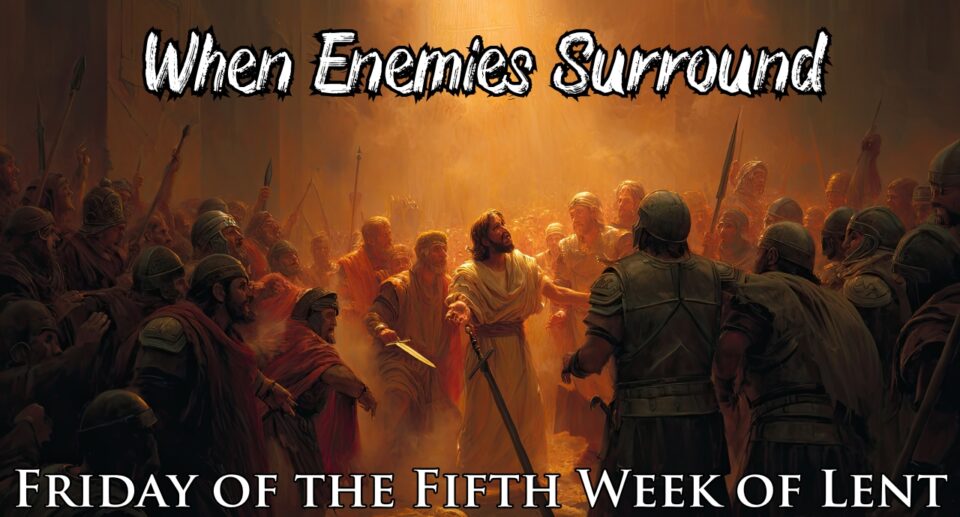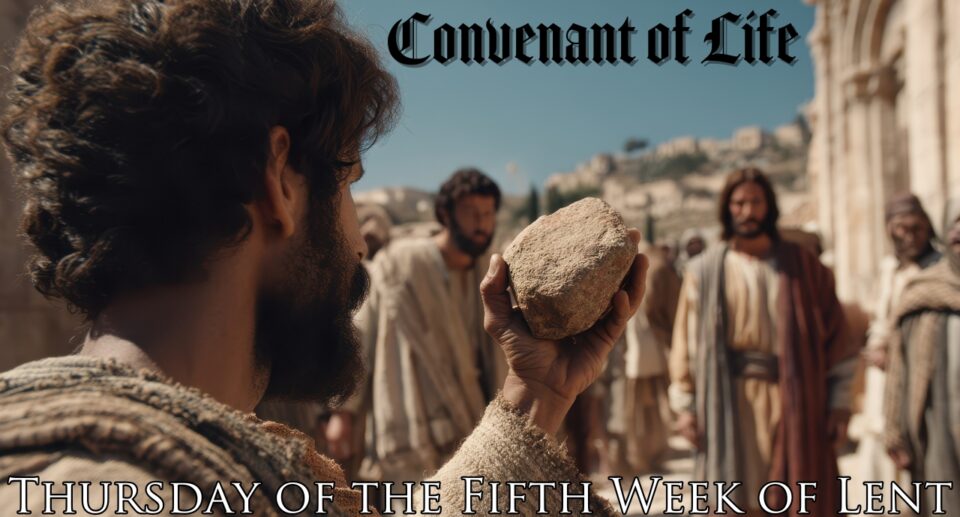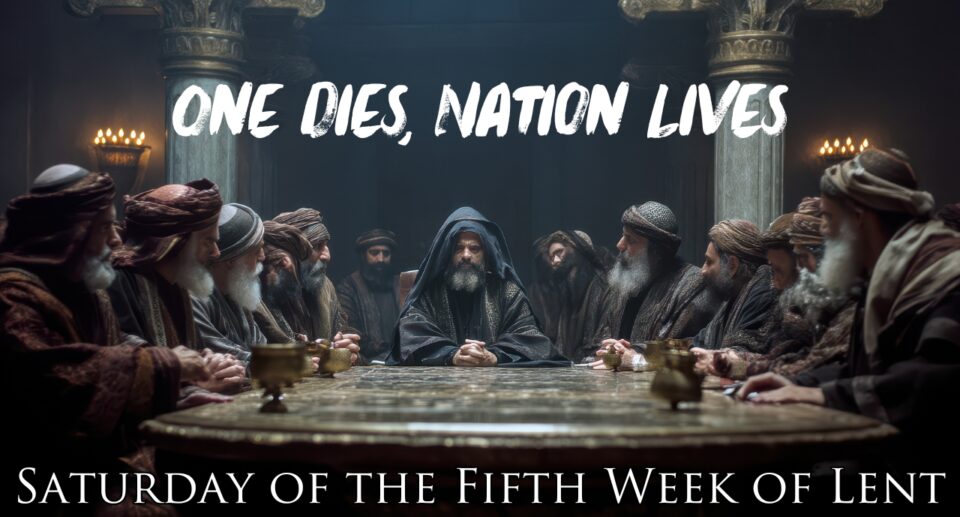When Enemies Surround: Finding Strength in the God Who Rescues | Daily Readings | April 11, 2025

When friends become enemies and whispers of accusation fill the air—today’s readings reveal a path forward when opposition surrounds us. From Jeremiah facing betrayal to Jesus confronting stone-wielding accusers, discover how to stand firm when it seems the whole world stands against you.
Through this reflection, you’ll discover:
- How to find unshakable strength when human support fails
- Why persecution cannot defeat those who know whose they are
- The profound connection between Jeremiah’s suffering and Christ’s passion
- How to respond to opposition without becoming bitter or compromising truth
Readings covered: Jeremiah 20:10-13; Psalm 18:2-7; John 10:31-42
Perfect for anyone facing criticism for their faith, dealing with betrayal, or needing courage to stand firm in difficult circumstances as we approach Holy Week.
#LentenReflection #FifthWeekOfLent #Jeremiah #JesusFacesOpposition #SpiritualCourage #HolyWeekPreparation #GodOurRock
When Enemies Surround: Finding Strength in the God Who Rescues
“I hear the whispers of many: ‘Terror on every side! Denounce him! Let us denounce him!'”
Jeremiah’s words echoed through the empty chamber as he scratched them onto the parchment. Outside, Jerusalem buzzed with plots and whispers. Friends had become spies. Confidants had become accusers. Even those who once broke bread with him now watched for his downfall.
“All those who were my friends are on the watch for any misstep of mine.”
The prophet’s hand trembled, not from fear but from the weight of solitude. He had spoken truth to power, and power had responded with fury. Now, alone except for the divine presence that burned within him like fire, he continued writing words that would echo across millennia to another man who would stand surrounded by enemies, with stones in their hands.
Today’s readings take us into the mind and heart of the persecuted faithful. Through Jeremiah, the Psalmist, and Jesus himself, we witness what it means to stand firm when surrounded by those who seek our destruction—and we discover the unshakable source of courage that makes such a stand possible.
In our first reading, we enter Jeremiah’s world at its darkest moment. Known as the “weeping prophet,” Jeremiah had the unenviable task of announcing Jerusalem’s coming destruction to a people who refused to hear it. His truthful warnings earned him not gratitude but persecution. The powerful saw him as a traitor undermining national morale. Religious leaders labeled him a heretic challenging temple theology. Even his neighbors in Anathoth plotted to kill him.
Yet in the midst of this terror, Jeremiah makes an astonishing pivot: “But the LORD is with me, like a mighty champion: my persecutors will stumble, they will not triumph.”
This sudden shift from lament to confidence isn’t wishful thinking or blind optimism. It’s the clear-eyed recognition that when human support falls away completely, divine presence remains. Jeremiah doesn’t pretend the danger isn’t real. He doesn’t minimize the threat. Instead, he places it alongside a greater reality—the presence of the living God who fights for the oppressed.
Our psalm continues this theme with David’s vivid imagery of desperate danger: “The breakers of death surged around me, the destroying floods overwhelmed me; the cords of the nether world enmeshed me, the snares of death overtook me.”
Here death isn’t an abstract concept but an active hunter, casting cords and setting snares. David feels its grip tightening around him. Yet like Jeremiah, he responds not with resignation but with radical trust: “In my distress I called upon the LORD and cried out to my God; from his temple he heard my voice, and my cry to him reached his ears.”
Both Jeremiah and David discover a profound truth: when we are most alone humanly speaking, we can experience God’s presence most powerfully. When every earthly support is stripped away, the eternal rock beneath becomes evident.
This brings us to our Gospel, where Jesus faces his own circle of accusers. “The Jews picked up rocks to stone him,” John tells us. Jesus stands surrounded by people clutching the instruments of his death, their faces contorted with the special rage reserved for those who challenge religious certainty.
Jesus’ response is remarkable. He doesn’t flee. He doesn’t call down fire from heaven. Instead, he reasons with them: “I have shown you many good works from my Father. For which of these are you trying to stone me?”
Even in this moment of acute danger, Jesus remains focused on his Father’s works. Like Jeremiah and David before him, his security doesn’t come from human approval but from divine alignment. He knows who he is and whose he is. This identity cannot be shaken by opposition, no matter how violent.
As we approach Holy Week, these readings offer profound insight into the psychology of Jesus’ passion. The hostility he faced didn’t begin in Gethsemane—it had been building throughout his ministry. The religious establishment had long been looking for ways to destroy him. The rocks lifted in today’s Gospel foreshadow the cross that awaits him just days from now.
Yet Jesus never allows his opponents’ perspective to define his reality. When they call him a blasphemer, he doesn’t internalize their accusation. Instead, he points again to the works that testify to his identity: “Even if you do not believe me, believe the works.”
There’s a striking parallel between Jeremiah’s “the LORD is with me, like a mighty champion” and Jesus’ “the Father is in me and I am in the Father.” Both find their center not in human opinion but in divine relationship. Both stand firm because they know who stands with them.
What does this mean for us today?
First, these readings acknowledge the reality of opposition. Following God faithfully will sometimes put us at odds with prevailing opinions, power structures, or cultural assumptions. Jeremiah, David, and Jesus all experienced the pain of rejection, betrayal, and threat. The Christian journey has never promised popularity or ease—only divine presence in the midst of whatever comes.
Second, we learn from these three figures that our response to opposition determines its power over us. Jeremiah could have softened his message to gain acceptance. David could have surrendered to despair when death’s cords tightened around him. Jesus could have moderated his claims to appease his critics. Instead, each turned to God as the source of their identity and strength.
Third, these readings reveal how God responds to the cries of the faithful. “From his temple he heard my voice,” David writes. The God who seems silent is actually attentive to every prayer uttered from the place of distress. The answer may not come in the form or timing we expect, but it comes with the full force of divine commitment to justice and rescue.
As we stand just one week away from Good Friday, these readings prepare us to understand Christ’s passion not as a surprising failure but as the culmination of a ministry that consistently provoked opposition. The cross doesn’t represent the defeat of Jesus’ mission but its fulfillment. In his willing embrace of rejection and suffering, Jesus demonstrates the ultimate expression of the truth Jeremiah discovered: that God’s champions may suffer but will ultimately triumph.
These readings also challenge us to examine our own response to opposition. When we face criticism, rejection, or even threat because of our faith or moral convictions, where do we turn? Do we compromise to gain approval? Do we respond with equal hostility? Or do we, like Jeremiah, David, and Jesus, root ourselves more deeply in the divine relationship that cannot be shaken by human opinion?
The temptation to seek security in human acceptance runs deep. We want to be liked, approved, included. Yet these readings suggest that true security comes from a different source—from knowing that “the LORD, the rock, my fortress, my deliverer” holds us regardless of what others think or do.
This doesn’t mean seeking opposition or wearing rejection as a badge of honor. Jesus himself tried to reason with his critics and pointed to his works as evidence they could understand. But when opposition came despite his best efforts, he remained anchored in his Father’s presence rather than swayed by the crowd’s rejection.
As this Lenten journey draws toward its climax, we might ask ourselves: What are the voices of “terror on every side” in our own lives? What whispers make us doubt our worth, question our path, or tempt us to compromise our convictions? These might be external voices of criticism or internal voices of self-doubt. Either way, they gain power when we listen to them more attentively than to the voice of the One who says, “You are mine.”
The antidote to fear is not the absence of threat but the presence of something—Someone—greater than whatever threatens us. Jeremiah found this presence even in a time of national collapse and personal danger. David discovered it when death’s cords seemed tightest around him. Jesus embodied it as stones were literally being raised to kill him.
This presence is available to us as well, not as a theoretical concept but as a lived reality. “I called upon the LORD,” David writes—a simple action with profound consequences. Whatever surrounds us today, whatever whispers of “terror on every side” hound our steps, the God who heard Jeremiah, David, and ultimately Jesus continues to hear every cry and stand as our mighty champion.
In this fifth week of Lent, with the cross looming ever closer on the horizon, may we find courage in the God who never abandons his own, even—especially—when everyone else does. And may we discover, like those who have walked this path before us, that the one who is with us is far greater than any who stand against us.






